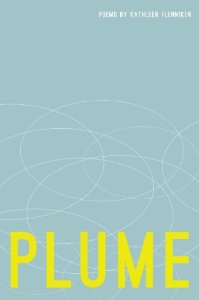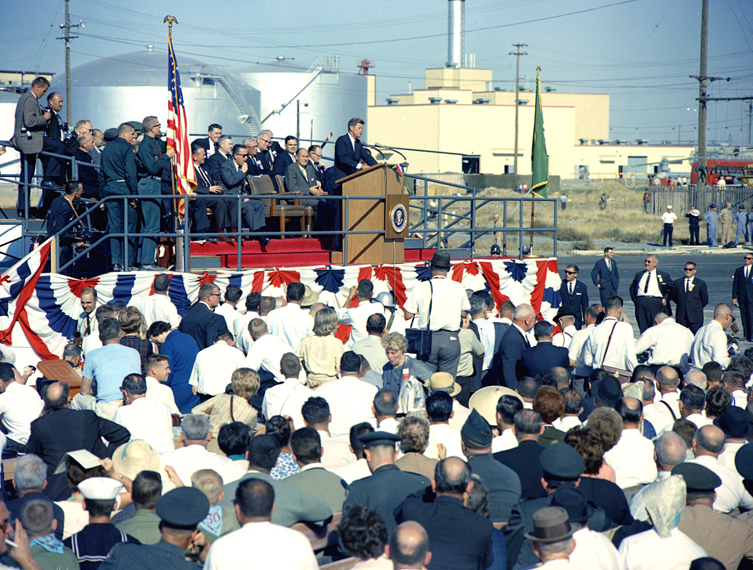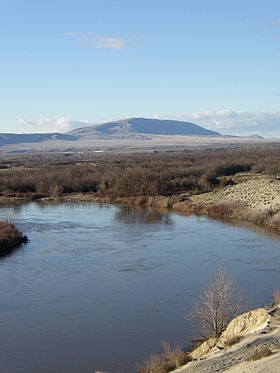 I received Plume, a book of poems by Kathleen Flenniken, from my daughter, who bought it for me because the author grew up in Richland, Washington, as I did.
I received Plume, a book of poems by Kathleen Flenniken, from my daughter, who bought it for me because the author grew up in Richland, Washington, as I did.
The poems in Plume are about Ms. Flenniken’s childhood in Richland and her work experience at the Hanford Nuclear Reservation, where she spent a few years as a hydrologist and engineer. I deduce from Ms. Flenniken’s poetry that we are close in age, certainly part of the same generation. I had temporary jobs during college summers at Hanford, and my father worked there for most of his career. Her poems evoked many memories for me.
I most enjoyed the early poems in Plume, about Ms. Flenniken’s childhood years in Richland. I remember Cottonwood Drive, where she lived. As a toddler, I lived nearby – the first home I remember was a government-built duplex like the ones she describes. I remember the Columbia River, the Horse Heaven Hills, the sagebrush, and the sand. I remember the duck-and-cover drills.
The first poem in Plume is My Earliest Memory Preserved in Film, about President Kennedy’s visit to Hanford on September 26, 1963. The poem’s first lines:
Somewhere in that sea of crisp white shirts
I’m sitting on my father’s shoulders
as you dedicate our new reactor and praise us . . .
I, too, was at that dedication of the N Reactor and saw President Kennedy. I was seven years old.
In that era, fathers dressed in suits, even for outdoor ceremonies on hot desert afternoons, so my father wore a dark suit. I don’t recall if he took off his jacket, but I’ll bet he was one of the “crisp white shirts.” I wore a sleeveless dress with a scratchy petticoat, white ankle socks, and my dress shoes. I don’t recall what my mother or brother wore.
As my father drove our family car in the long procession of cars from town out to Hanford for the event, we came alongside another vehicle in which my classmate Barbara rode. In the stop-and-go traffic, Barbara and I waved to each other as one car passed the other. Back and forth we went, in a two-lane parade, all headed for a temporary parking lot marked out in the desert dirt.

When we got to the sea of people that the poet describes, our family was way back in the crowd, and I was too short to see the speaker’s podium without a boost. So, like Ms. Flenniken, I saw President Kennedy from a perch on my father’s shoulders. I don’t remember what the President said, but I remember seeing him and the crowd from the safety of my father’s grasp.
And, like Ms. Flenniken, I remember the President’s death just a few weeks later.
My memories, so similar to hers.
Ms. Flenniken’s next poem is Rattlesnake Mountain, about a landmark near Hanford, which locals claim is the tallest mountain in the world without a tree.

As the story goes, soldiers stationed on Rattlesnake Mountain as part of the World War II defense of Hanford planted a tree during the war years, but it died. The 3,500-foot-high mountain is windswept, sand blown, and stark, covered with grasses and sage, but nothing else.
I remember a field trip to the observatory on Rattlesnake during my high school Physics class. The sound of the battering wind whipping our jackets around our torsos was louder than the teacher’s lecture. I don’t think the wind ever ceased at the mountain’s top.
And whenever we drove to Seattle, we passed Rattlesnake and the Hanford Nuclear Reservation to get to the Vernita Bridge to cross the Columbia River. The mountain rose, a solitary mound above the barren land, beyond the high fence that kept humans away from Hanford, though birds and jackrabbits got through with ease.
On one trip past Rattlesnake, my father told us about Enrico Fermi and others building the reactors at Hanford during World War II. “Why don’t they open a museum out here?” I asked, awed at the history he described.
“They can’t,” he said. “It’s hotter than a pancake.” That was when I first realized the extent of the nuclear contamination at Hanford.
My childhood revisited through a book of poems.
What prompts have recently brought your childhood to mind?




An interesting post and final question. I enjoy seeing the same situation through different observers’ eyes as we don’t all see exactly the same thing.
This post brought back childhood memories of the “Camelot” of the Kennedy years, the devastation of his assassination and the picture I keep in my mind of him and his family to this very day. So your blog counts as one thing that prompted memories of my childhood.
Last week I came across a photograph of my mother, father and sister standing together in a river. The evoked the memory of long afternoons playing in the Platte River north of St. Joseph at Platte Falls.
Those are the two most recent prompts that brought up stories about my childhood.
Again, thanks for sharing your story.
The memories are everywhere we look. And there’s a story behind why we remember.
Thanks for posting, Bob.
Theresa
Isn’t it wonderful how the work of others triggers? I recently read Paul Auster’s “Winter Journal” and had the same experience of remembering. My journal carries three pages of the ways I’ve received scars from that book’s prompting. And interesting exercise for me – I’d recommend the book, nicely written, unusual in it’s format.
Thanks, Janet. I’ll look for Auster’s book.
Theresa
Your memories triggered some of mine about the year you were born, my dear!
THE WHAT-IF’S
In the fall of 1956, I was almost fourteen. The Cold War with Russia was in full swing. To this point, my life had been relatively simple and routine. Church on Sunday, followed by dinner at Grandma’s. Monday through Friday, school followed by piano lessons on Thursdays at Mrs. Hill’s house. On Saturday mornings I took ballet lessons above a downtown store front with Thelma Parker. Mom had successfully shielded me from much of the unpleasantness of the world. Dad spent WWII in Germany. After he came home, she shut the world out. Like Scarlett O’Hara, she would “think about that tomorrow.”
As an adult looking back, I hardly remember anything of the Korean Conflict. Granted, I was only nine, but we did have a TV at that time, and Mom made sure when the news came on, the TV went off.
“No need to watch that stuff,” she’d say.
All of her shielding couldn’t keep the world out that day in 1956, when the kids at school said President Kruschev, leader of Russia, pounded his shoe on a desk and said, “We will bury you!”
I came home from school that afternoon with a heavy heart. I dragged into the kitchen, dropped my books on the floor, and slumped into a chair, despite the aroma of baking chocolate chip cookies.
“What’s wrong, honey? You look like you’ve got the weight of the world on your shoulders.”
Mom set some fresh cookies before me with a glass of milk.
“Want to talk about it?”
I ignored the snack and stared at the floor. I had trouble forming my swirling thoughts into words. Finally, I spoke.
“Mom, do you believe what Kruschev said?”
“What did you hear he said?”
Suddenly the words tumbled out in a torrent. “The kids said, Kruschev said, the Russians would bury us. Did he really say that? How could a leader of a country be so mean? Why do the Russians hate us so much? What have we ever done to them? My friend, Susan, said her folks are going to build a bomb shelter. What if the Russians bomb us, Mom?”
Mom pulled up a chair across from me and sat very quiet for a long time. She took my hands in hers and looked into my eyes. Finally she spoke. “What if he doesn’t?”
I didn’t wait for her words to soak in. “What if . . .”
Mom gripped my hands tighter, “My dear, listen to me, ‘if’ is the biggest little word in the English language. Most folks worry their lives away on what never happens. Apply your “what if’s” to positive possibilities rather than the negative.”
Throughout my years, I have practiced the wisdom Mom gave me on that day. With four children, her wisdom has served me well.
Wow, Sally, that’s quite a memory. Thanks for sharing your story.
Theresa
[…] growing up, cottonwood seeds on the hot, dry desert wind were a sign that summer had truly arrived. As I’ve mentioned before, my home town had a Cottonwood Drive. This street wasn’t near my house, but we occasionally drove […]
[…] I have mentioned before, President Kennedy visited my hometown in September 1963, and I saw him in person. I was more […]
[…] American treaties made and broken and reinstated by the courts, the development of plutonium at the Hanford Reservation, and […]